Now Reading: School Mid-Day Meals: Eggs for Children Require Parental Consent
-
01
School Mid-Day Meals: Eggs for Children Require Parental Consent
School Mid-Day Meals: Eggs for Children Require Parental Consent
Quick Summary:
- KarnatakaS State government plans to seek written parental consent before providing eggs in midday meals for schoolchildren, aiming to address concerns and streamline distribution.
- An Azim Premji Foundation study revealed that out of 762 schools visited, 562 were not distributing eggs appropriately despite allocating ₹1,500 crore for a three-year supply. Some School Advancement and Monitoring Committees (SDMCs) had resolutions against serving eggs on specific days.
- Issues surrounding egg distribution include parental objections, religious practices during certain times like the Shravana month, and inconsistent consumption by students.
- sdmcs manage food alternatives like bananas as well as decisions on egg supply logistics.
- The State government is revising sanitation budgets for school toilets to ensure better maintenance so teachers or students are not forced to clean them themselves.Plans include a hike in maintenance allocation from 10% to 30%,with rates adjusted based on student strength per school instead of uniform costs across schools.
- Current data shows 2,501 toilets in government PU colleges lack water connection; districts such as Chamarajanagar and Bengaluru North/South have the highest deficits.
Indian Opinion Analysis:
The government’s plan to obtain prior parental consent signals an attempt at wider inclusion while navigating cultural sensitivities regarding dietary preferences in public midday meal programs. Addressing inefficiencies revealed by external audits (such as those reported by Azim Premji Foundation), along with managing logistical hurdles via SDMC participation, could potentially improve outcomes if executed effectively.
On sanitation infrastructure reforms, the proposed increase in budget allocations demonstrates awareness of challenges endemic across schools statewide-like lack of resources or unfair burdens placed on educators-but may still leave large gaps if implementation does not account adequately for localized needs highlighted by data (e.g.,high gaps in toilet facilities reported). Both initiatives suggest a focus on balancing administrative complexity with equitable access but will require consistent monitoring for impacts at scale.
Read more: Source Link

























